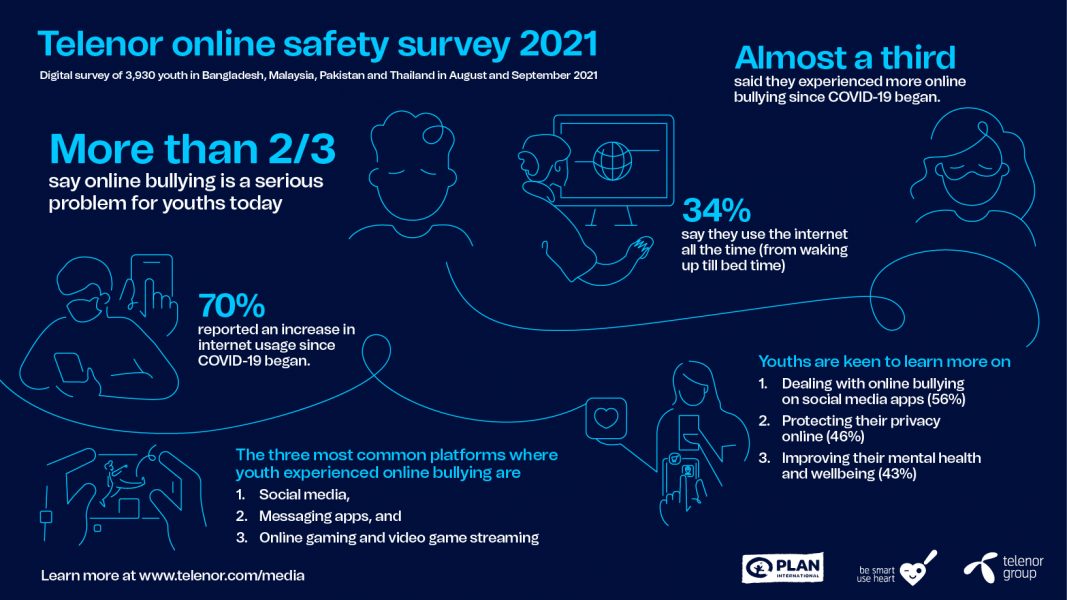Youths call for continued guidance to tackle online bullying amid increased internet use

More than two-thirds (68 percent) of 3,930 youths surveyed from Bangladesh, Malaysia, Pakistan, and Thailand agreed that online bullying is a serious problem for young people today. Of the youths surveyed, 1 in 4 (25 percent) said they were bullied before the pandemic began and in terms of intensity, almost a third (29 percent) said they experienced more online bullying since the onset of COVID-19.
The survey, conducted in August 2021 by Telenor Group, in partnership with Plan International, found that 14 percent of youths experienced online bullying at least once a week or more. Respondents selected social media, messaging apps, and online gaming and video game streaming as top three platforms where they experienced online bullying.
The survey also revealed that youths who were bullied online used a range of tactics to stop the bullying. These spanned from ignoring the bully which resulted in the person stopping, changing security settings online so the person could not contact them, and speaking to a parent or guardian about the problem.

Refreshers on staying safe online needed
“With the marked increase in time spent on the internet by youth during the pandemic, there is a clear need to better equip youth with ways and methods to protect themselves online. It is crucial that awareness, training on online bullying and building digital resilience be a multi-stakeholder exercise. This should not be left just to educational institutions but should also involve parents and caregivers,” said Manisha Dogra, VP, Sustainability for Telenor in Asia.
“While companies such as Telenor already play an active role in Online Safety initiatives, results can be amplified even more with collaborative participation, in partnerships with governments, civil society and academia.”
Given the importance of this topic for youth, and the heightened intensity of online bullying since the pandemic, youths were eager for more training and guidance on how to deal with online bullying on social media apps (56 percent), how to protect their privacy online (46 percent) and how to improve their mental health and wellbeing (43 percent). Additionally, the respondents were interested in protecting themselves from online bullies on messaging apps (40 percent) and dealing with online bullying during gaming and streaming video games (37 percent).
“The Internet brings people together and provides critical access to information. But as this survey show, navigating the digital landscape can also be challenging. Plan International’s research additionally shows that girls and young women in Asia often experience harassment and abuse when they go online. This can drive them offline which silences their voices and restricts their opportunities. Bridging the digital gap is necessary to advance gender equality. To accomplish this, there is a clear need to invest in digital literacy for girls, youth, and their families,” said Krista Zimmerman, Director of Influencing and Programs, Plan International Asia-Pacific.
Increased internet time
Overall, 70 percent of youths surveyed used much more or more time on the internet since COVID-19 began. 34 percent in said they use the internet all the time – from waking up till bedtime – while 24 percent used it mostly in the evenings, and only 7 percent limited their use to only during school hours.
Continuous internet usage varied between countries. 47 percent of surveyed Thai youths used internet use all the time, while this was the case for 45 percent of surveyed Malaysian youths. 35 percent of youth in Bangladesh and 17 percent in Pakistan said they used the internet all the time.
Telenor’s top tips to stay safe online
For parents, guardians, caregivers, and youths who want to learn more about staying safe online, here are top tips:
For parents
Start a conversation by asking them about their life on the web.
Be open. It may be difficult for them to open up, so make them feel as safe and comfortable as possible.
Find out how different social apps are used. This will make it easier to know where the risks are for your child.
For youths
Think before posting. Put yourself in the other person’s shoes before sharing something that is potentially hurtful.
Protect your passwords. Don’t share them, not even with your best friend, and don’t give out your personal information online.
Get help. Don’t suffer alone if you are being bullied. Find a friend or trusted adult, or call a local helpline where you’ll find experts who are trained to support you.
Further resources are at:
David Fidjeland
Director, Media Relations
Telenor Group
About the survey[i]
Regional demographics
Telenor Group ran a survey on the impact of COVID-19 on online bullying and online use, and sworked with global sustainability partner, Plan International, to develop the questionnaire and to examine the survey results. The survey was disseminated in four countries: Bangladesh, Malaysia, Pakistan, and Thailand through social media and youth/educational networks. All surveys were anonymous and translated to relevant local languages.
Key survey figures:
Nearly 4,000 (3,930) people participated in survey across four countries
Responses by gender: females (50 percent), males (47 percent), and prefer not to say or nonbinary (3 percent)
Respondents’ countries: Malaysia (38 percent), Pakistan (34 percent), Bangladesh (16 percent), Thailand (12 percent)
Most respondents from 13-15 (42 percent) and 16-18 (32 percent) years of age; other age groups were below 10 (1 percent); 10-12 (6 percent); and 19-21 (18 percent).
About Telenor
Telenor Group connects its 169 million customers to what matters most. Connecting the world has been Telenor’s domain for more than 160 years and we currently operate across the Nordics and Asia. We are committed to responsible business conduct and driven by the ambition of empowering societies.
About Plan International
Founded in 1937, Plan International is an independent development and humanitarian organization that advances children’s rights and equality for girls. We strive for a just world, working together with children, young people, supporters and partners. Using our reach, experience and knowledge, we drive change in practice and policy at local, national and global levels. We are independent of governments, religions and political parties. For more than 80 years, we have been building powerful partnerships for children and are active in more than 75 countries.
[i] Survey figures are rounded and may not add up to 100 percent. As answering all survey questions was not mandatory, response numbers vary slightly from question to question.